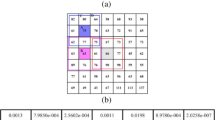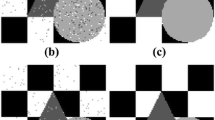Abstract
In this paper, we address the problem of the fuzzy c-means (FCM) algorithm sensitivity to noise when clustering image pixels. We propose in this regard an improved FCM algorithm that incorporates contextual information at the membership degrees updating stage. For that aim, we introduce two novel parameters: the contextual similarity degree and the intrinsic similarity degree which are used to estimate each pixel’s nature (normal or noisy), according respectively to its context and to its specific features. Based on this estimation, we propose a modified membership degrees updating strategy that proceeds by adaptively reinforcing the assignment of a pixel to its context’s cluster when this pixel is detected as noisy. Experiments performed on synthetic and real-world images proved that our approach achieves competitive performance compared to state-of-the-art FCM-based methods.



















Similar content being viewed by others
Data Availability
The data analyzed during the current study are available from the corresponding author upon request.
Code Availability
The code used in this work will be publicly shared once the paper is accepted for publication.
References
Adhikari, S. K., Sing, J. K., Basu, D. K., & Nasipuri, M. (2015). Conditional spatial fuzzy c-means clustering algorithm for segmentation of MRI images. Applied Soft Computing, 34, 758–769.
Ahmed, M. N., Yamany, S. M., Mohamed, N., Farag, A. A., & Moriarty, T. (2002). A modified fuzzy c-means algorithm for bias field estimation and segmentation of MRI data. IEEE Transactions on Medical Imaging, 21(3), 193–199.
Alruwaili, M., Siddiqi, M. H., & Javed, M. A. (2020). A robust clustering algorithm using spatial fuzzy c-means for brain MR images. Egyptian Informatics Journal, 21(1), 51–66.
Ayech, M. W., El Kalti, K., and El Ayeb, B. (2010) “Image segmentation based on adaptive fuzzy-c-means clustering." In 2010 20th International Conference on Pattern Recognition, 2306–2309. IEEE
Bezdek, J. C., Ehrlich, R., & Full, W. (1984). FCM: The fuzzy c-means clustering algorithm. Computers & Geosciences, 10(2–3), 191–203.
Cai, W., Chen, S., & Zhang, D. (2007). Fast and robust fuzzy c-means clustering algorithms incorporating local information for image segmentation. Pattern Recognition, 40(3), 825–838.
Chang-Chien, S.-J., Nataliani, Y., & Yang, M.-S. (2021). Gaussian-kernel c-means clustering algorithms. Soft Computing, 25(3), 1699–1716.
Chen, S. & Zhang, D. (2004) “Robust image segmentation using FCM with spatial constraints based on new kernel-induced distance measure." IEEE Transactions on Systems, Man, and Cybernetics, Part B (Cybernetics), 34(4), 1907–1916
Choudhry, M. S., & Kapoor, R. (2016). Performance analysis of fuzzy c-means clustering methods for MRI image segmentation. Procedia Computer Science, 89, 749–758.
Chuang, K.-S., Tzeng, H.-L., Chen, S., Wu, J., & Chen, T.-J. (2006). Fuzzy c-means clustering with spatial information for image segmentation. Computerized Medical Imaging and Graphics, 30(1), 9–15.
Despotovic, I., Vansteenkiste, E., & Philips, W. (2013). Spatially coherent fuzzy clustering for accurate and noise-robust image segmentation. IEEE Signal Processing Letters, 20(4), 295–298.
Elazab, A., Wang, C., Jia, F., Wu, J., Li, G., & Hu, Q. (2015) “Segmentation of brain tissues from magnetic resonance images using adaptively regularized kernel-based fuzzy-means clustering." Computational and Mathematical Methods in Medicine, 2015
Elhedda, W., Mehri, M., & Mahjoub, M. A. (2020). Hyperkernel-based intuitionistic fuzzy c-means for denoising color archival document images. International Journal on Document Analysis and Recognition (IJDAR), 23(3), 161–181.
Fan, J.-L., Zhen, W.-Z., & Xie, W.-X. (2003). Suppressed fuzzy c-means clustering algorithm. Pattern Recognition Letters, 24(9–10), 1607–1612.
Jain, A. K. (2010). Data clustering: 50 years beyond K-means. Pattern Recognition Letters, 31(8), 651–666.
Kalaiselvi, S., & Gomathi, V. (2020). \(\alpha \)-cut induced fuzzy deep neural network or change detection of SAR images. Applied Soft Computing, 95, 106510.
Krinidis, S., & Chatzis, V. (2010). A robust fuzzy local information c-means clustering algorithm. IEEE Transactions on Image Processing, 19(5), 1328–1337.
Lei, T., Jia, X., Zhang, Y., He, L., Meng, H., & Nandi, A. K. (2018) “Significantly fast and robust fuzzy c-means clustering algorithm based on morphological reconstruction and membership filtering." ’IEEE Transactions on Fuzzy Systems, 26(5), 3027–3041
Li, M., & Li, Y.-S. (2006) “Fuzzy-c-means clustering based on the gray and spatial feature for image segmentation." In 2006 International Conference on Computational Intelligence and Security, 2, 1641–1646. IEEE
Liew, A., Leung, S., & Lau, W. (2000). Fuzzy image clustering incorporating spatial continuity. IEE Proceedings-Vision, Image and Signal Processing, 147(2), 185–192.
Liew, A.-C., Leung, S. H., & Lau, W. H. (2003). Segmentation of color lip images by spatial fuzzy clustering. IEEE transactions on Fuzzy Systems, 11(4), 542–549.
Mohamed, N. A., Ahmed, M., & Farag, A. (1998) “Modified fuzzy c-mean in medical image segmentation." In Proceedings of the 20th Annual International Conference of the IEEE Engineering in Medicine and Biology Society. Vol. 20 Biomedical Engineering Towards the Year 2000 and Beyond (Cat. No. 98CH36286), 3, 1377–1380. IEEE
Shamsi, H., & Seyedarabi, H. (2012). A modified fuzzy c-means clustering with spatial information for image segmentation. International Journal of Computer Theory and Engineering, 4(5), 762.
Szilagyi, L., Benyo, Z., Szilágyi, S. M., & Adam, H. (2003) “MR brain image segmentation using an enhanced fuzzy c-means algorithm." In Proceedings of the 25th annual international conference of the IEEE engineering in medicine and biology society (IEEE Cat. No. 03CH37439), 1, 724–726. IEEE
Tian, J. W., Yu, Y. L., & Shen, T. (2012) “FCM clustering segmentation algorithms based on spatial constraint." In Advanced Materials Research, 411, 497–500. Trans Tech Publ
Tolias, Y. A., & Panas, S. M. (1998). On applying spatial constraints in fuzzy image clustering using a fuzzy rule-based system. IEEE Signal Processing Letters, 5(10), 245–247.
Wang, C., Pedrycz, W., Li, Z., & Zhou, M. (2020). Residual-driven fuzzy c-means clustering for image segmentation. IEEE/CAA Journal of Automatica Sinica, 8(4), 876–889.
Wang, C., Pedrycz, W., Zhou, M., & Li, Z. (2020). Sparse regularization-based fuzzy c-means clustering incorporating morphological grayscale reconstruction and wavelet frames. IEEE Transactions on Fuzzy Systems, 29(7), 1826–1840.
Wang, Q., Wang, X., Fang, C., & Jiao, J. (2021). Fuzzy image clustering incorporating local and region-level information with median memberships. Applied Soft Computing, 105, 107245.
Wang, Q., Wang, X., Fang, C., & Yang, W. (2020). Robust fuzzy c-means clustering algorithm with adaptive spatial & intensity constraint and membership linking for noise image segmentation. Applied Soft Computing, 92, 106318.
Wang, Z., Song, Q., Soh, Y. C., & Sim, K. (2013). An adaptive spatial information-theoretic fuzzy clustering algorithm for image segmentation. Computer Vision and Image Understanding, 117(10), 1412–1420.
Yang, M.-S., & Tsai, H.-S. (2008). A Gaussian kernel-based fuzzy c-means algorithm with a spatial bias correction. Pattern Recognition Letters, 29(12), 1713–1725.
Yang, X., Zhang, G., Lu, J., & Ma, J. (2010). A kernel fuzzy c-means clustering-based fuzzy support vector machine algorithm for classification problems with outliers or noises. IEEE Transactions on Fuzzy Systems, 19, 105–115.
Zhang, X., Pan, W., Wu, Z., Chen, J., Mao, Y., & Wu, R. (2020). Robust image segmentation using fuzzy c-means clustering with spatial information based on total generalized variation. IEEE Access, 8, 95681–95697.
Zhao, F., Jiao, L., & Liu, H. (2013). Kernel generalized fuzzy c-means clustering with spatial information for image segmentation. Digital Signal Processing, 23(1), 184–199.
Zhao, F., Liu, F., Li, C., Liu, H., Lan, R., & Fan, J. (2021). Coarse-fine surrogate model driven multiobjective evolutionary fuzzy clustering algorithm with dual memberships for noisy image segmentation. Applied Soft Computing, 112, 107778.
Zhao, F., Liu, H., & Fan, J. (2015). A multiobjective spatial fuzzy clustering algorithm for image segmentation. Applied Soft Computing, 30, 48–57.
Acknowledgements
The authors thank the editor, the associate editor, and the referees for their constructive comments that helped to improve this manuscript.
Author information
Authors and Affiliations
Corresponding author
Ethics declarations
Ethical Approval
The paper has been prepared in compliance with ethical standards.
Conflict of Interest
The authors declare no competing interests.
Additional information
Publisher's Note
Springer Nature remains neutral with regard to jurisdictional claims in published maps and institutional affiliations.
Rights and permissions
Springer Nature or its licensor (e.g. a society or other partner) holds exclusive rights to this article under a publishing agreement with the author(s) or other rightsholder(s); author self-archiving of the accepted manuscript version of this article is solely governed by the terms of such publishing agreement and applicable law.
About this article
Cite this article
Kalti, K., Touil, A. A Robust Contextual Fuzzy C-Means Clustering Algorithm for Noisy Image Segmentation. J Classif 40, 488–512 (2023). https://doi.org/10.1007/s00357-023-09443-1
Accepted:
Published:
Issue Date:
DOI: https://doi.org/10.1007/s00357-023-09443-1




